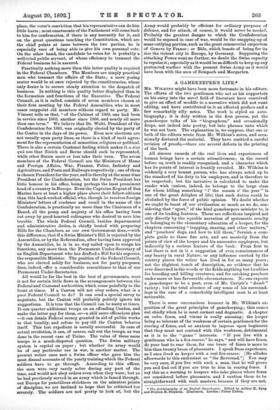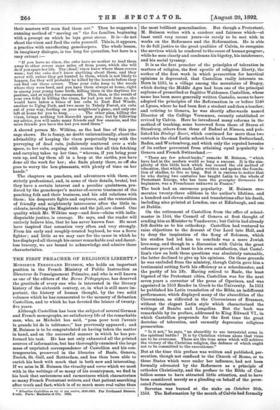A GAMEKEEPER'S LIFE.*
Ma. WILKINS might have been more fortunate in his editors. The efforts of the two gentlemen who act as his supporters on his entry into the novel field of literature have contrived to give an effect of muddle to a narrative which did not want editing, and have contributed to it an affected preface and a few remarkably silly notes. The work is styled an auto- biography; it is duly written in the first person, yet the gamekeeper talks of his "biographers," and occasionally drops, not indeed into poetry, but into phrases unto which he was not born. The explanation is, we suppose, that one or both of the editors wrote from Mr. Wilkins's notes, and occa- sionally doctored the material. They have omitted a careful revision of proofs,—there are several defects in the printing of the book.
All sincere records of the real lives and experiences of human beings have a certain attractiveness; in the record before us, truth is readily recognised, and a character which has its points of interest is frankly revealed. Mr. Wilkins is evidently a very honest person, who has always acted up to the standard of his duty to his employers, and is therefore to be respected; but his narrative is calculated to make the reader wish (unless, indeed, he belongs to the large class
for whom killing something " i' the season o' the year" is one of the great delights of life) that such duties could be abolished by the force of public opinion. We doubt whether we ought to boast of our civilisation so much as we do, con- sidering that "sport," of the kind gamekeepers minister to, is one of its leading features. These are reflections inspired not only directly by the equable narration of systematic cruelty as belonging to the elementary education of a keeper, for the chapters concerning "trapping, snaring, and other matters," and "poachers' dogs, and how to kill them," furnish a com- plete guide to those fine arts, and are masterly from the points of view of the keeper and his successive employers, but indirectly by a curious feature of the book. From first to last there is not in it a suggestion of even consciousness of any beauty in rural Nature, or any influence exerted by the country places the writer has lived in for so many years ; not the slightest touch of description, no evidence that he ever discerned in the woods or the fields anything bat localities for breeding and killing creatures, and for catching poachers under more or less favourable circumstances. No one expects a. gamekeeper to be a poet, even of Mr. Carlyle's " dumb " variety; but the total absence of any sense of his surround- ings in the case of a remarkably intelligent man is at least noticeable.
There is some unconscious humour in Mr. Wilkins's ex- position of the great principles of gamekeeping ; this comes out chiefly when he is most earnest and dogmatic. A chapter on cubs, foxes, and vixens is really amusing; the keeper being so tolerant of the weakness of certain gentlemen for the rearing of foxes, and so anxious to impress upon beginners that they must not contend with this weakness, detrimental as it is to the " game " interests. "If you live with a gentleman who is a fox-rearer," he says, "and will have foxes, do your best to rear them, for one brace of foxes is more to him than twenty brace of pheasants. I speak from experience, as I once lived as keeper with a real fox-rearer. [He alludes afterwards to this enthusiast as "the Reverend."] You may be very sure, if you live with such a man, that he will prove you and find out if you are true to him in rearing foxes. I say this as a warning to keepers who take places where foxes are considered before pheasants, and I caution them. to be -straightforward with such masters, because if they are not, * The Autobiography of an English Gamekeeper. Edited by Arthur H. Byng and Stephen M. Stephens. Illustrated. London: Fisher their masters will soon find them out." Then he suggests a cunning method of "moving on" the fox families, beginning
with a precept on which he lays great stress. It is—do not shoot the vixen and feed the cubs yourself. This is, it appears, a practice with unreflecting gamekeepers. The whole lesson, in imaginary dialogue, is too long for quotation, but here is a racy extract :—
" If you have no vixen, the cubs have no mother to lead them away to other covers some miles off from yours, which she will do if you spare her life. The [dead] vixen knew where these covers were ; but the cubs don't know anything about them, and they never will, unless they get hunted to them, which is not likely to happen, for they will probably be killed by the hounds before they can find out these covers. Thus your cubs keep to the woods where they were bred, and you have them always at home, right in among your young tame birds, killing them in the daytime for pastime, and at night for amusement This, then, is the result of your own folly in killing the vixen, for had you not done so, she would have taken a brace of her cubs to East End Woods, another to trgleg Park, and two more to Takely Forest, six cubs out of your way, feeding on your neighbour's game, and only one
left at home for you to keep The other plan, killing the vixen, brings nothing but discredit upon you; but by fallowing my advice, you will make many friends and few enemies, and the more friends you have the less you need them."
A shrewd person Mr. Wilkins, as the last line of this pas- sage shows. He is funny, no doubt unintentionally, about the advisability of keeping the vixen perpetually busy with the purveying of dead rats, judiciously scattered over a wide space, to her cubs, arguing with reason that all this fetching
and carrying takes up her time, "whereas, if you bring your rats up, and lay them all in a heap at the earths, you have done all the work for her ; she finds plenty there, so off she
goes to worry the hen-pheasants, with plenty of time on her hands."
The chapters on poachers, and adventures with them, are strictly professional, and, in some of their details, brutal, but they have a certain interest and a peculiar quaintness, pro- duced by the gamekeeper's matter-of-course treatment of the poaching folk and their business, and his odd relations with them ; his desperate fights and captures, and the restoration of friendly and neighbourly intercourse after the little in- cidents, involving the Magistrate and the jail, are closed. One quality which Mr. Wilkins may—and does—claim with indis- disputable justice, is courage. He says, and the reader will entirely believe him, that he has never known fear. He must have inspired that sensation very often and very strongly.
From his early and roughly-treated boyhood, he was a fierce fighter ; and little as we may care for the cause in which he has displayed all through his career remarkable zeal and daunt- less bravery, we are bound to acknowledge and admire those characteristics.



































 Previous page
Previous page